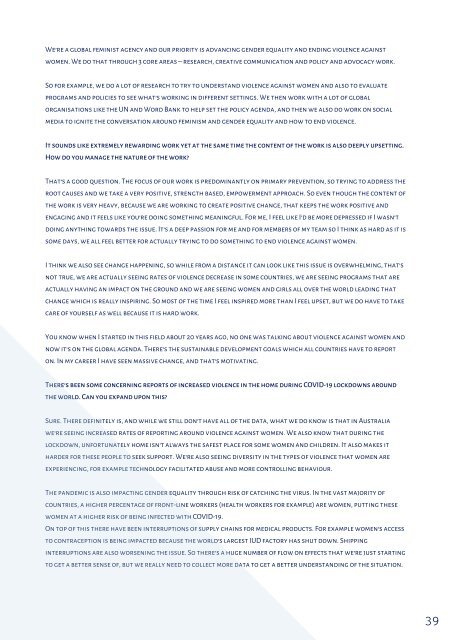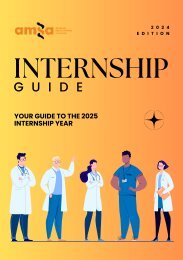PANACEA 2020
panacea /ˌpanəˈsiːə/ noun a solution or remedy for all difficulties or diseases. The term ‘Panacea’ embodies humanity’s unfaltering idealism, our wishful thinking and our unattainable dreams. It is this idealism which lays the foundation for our ambition and perseverance in the face of unparalleled hardship, and which fuels our resilience after defeat. In a time like the present and indeed throughout history, the concept of a ‘Panacea’ has been a frank deviation from reality – it is nothing more than a fantasy or escape. Nonetheless, for us, ‘Panacea’ is a delight, a source of hope and a symbol of our unending optimism. This year, the theme of AMSA’s student magazine, Panacea, is “When the dust settles: Reflection and renewal in a COVID-19 world.” We asked medical students from across Australia to submit written pieces or artwork relevant to the theme, for publication in a colourful and engaging digital magazine. Please enjoy the compilation of these wonderful works in Panacea 2020.
panacea
/ˌpanəˈsiːə/
noun
a solution or remedy for all difficulties or diseases.
The term ‘Panacea’ embodies humanity’s unfaltering idealism, our wishful thinking and our unattainable dreams. It is this idealism which lays the foundation for our ambition and perseverance in the face of unparalleled hardship, and which fuels our resilience after defeat. In a time like the present and indeed throughout history, the concept of a ‘Panacea’ has been a frank deviation from reality – it is nothing more than a fantasy or escape. Nonetheless, for us, ‘Panacea’ is a delight, a source of hope and a symbol of our unending optimism.
This year, the theme of AMSA’s student magazine, Panacea, is “When the dust settles: Reflection and renewal in a COVID-19 world.” We asked medical students from across Australia to submit written pieces or artwork relevant to the theme, for publication in a colourful and engaging digital magazine. Please enjoy the compilation of these wonderful works in Panacea 2020.
You also want an ePaper? Increase the reach of your titles
YUMPU automatically turns print PDFs into web optimized ePapers that Google loves.
We’re a global feminist agency and our priority is advancing gender equality and ending violence against<br />
women. We do that through 3 core areas – research, creative communication and policy and advocacy work.<br />
So for example, we do a lot of research to try to understand violence against women and also to evaluate<br />
programs and policies to see what’s working in different settings. We then work with a lot of global<br />
organisations like the UN and Word Bank to help set the policy agenda, and then we also do work on social<br />
media to ignite the conversation around feminism and gender equality and how to end violence.<br />
It sounds like extremely rewarding work yet at the same time the content of the work is also deeply upsetting.<br />
How do you manage the nature of the work?<br />
That’s a good question. The focus of our work is predominantly on primary prevention, so trying to address the<br />
root causes and we take a very positive, strength based, empowerment approach. So even though the content of<br />
the work is very heavy, because we are working to create positive change, that keeps the work positive and<br />
engaging and it feels like you’re doing something meaningful. For me, I feel like I’d be more depressed if I wasn’t<br />
doing anything towards the issue. It’s a deep passion for me and for members of my team so I think as hard as it is<br />
some days, we all feel better for actually trying to do something to end violence against women.<br />
I think we also see change happening, so while from a distance it can look like this issue is overwhelming, that’s<br />
not true, we are actually seeing rates of violence decrease in some countries, we are seeing programs that are<br />
actually having an impact on the ground and we are seeing women and girls all over the world leading that<br />
change which is really inspiring. So most of the time I feel inspired more than I feel upset, but we do have to take<br />
care of yourself as well because it is hard work.<br />
You know when I started in this field about 20 years ago, no one was talking about violence against women and<br />
now it’s on the global agenda. There’s the sustainable development goals which all countries have to report<br />
on. In my career I have seen massive change, and that’s motivating.<br />
There’s been some concerning reports of increased violence in the home during COVID-19 lockdowns around<br />
the world. Can you expand upon this?<br />
Sure. There definitely is, and while we still don’t have all of the data, what we do know is that in Australia<br />
we’re seeing increased rates of reporting around violence against women. We also know that during the<br />
lockdown, unfortunately home isn’t always the safest place for some women and children. It also makes it<br />
harder for these people to seek support. We’re also seeing diversity in the types of violence that women are<br />
experiencing, for example technology facilitated abuse and more controlling behaviour.<br />
The pandemic is also impacting gender equality through risk of catching the virus. In the vast majority of<br />
countries, a higher percentage of front-line workers (health workers for example) are women, putting these<br />
women at a higher risk of being infected with COVID-19.<br />
On top of this there have been interruptions of supply chains for medical products. For example women’s access<br />
to contraception is being impacted because the world’s largest IUD factory has shut down. Shipping<br />
interruptions are also worsening the issue. So there’s a huge number of flow on effects that we’re just starting<br />
to get a better sense of, but we really need to collect more data to get a better understanding of the situation.<br />
39

















